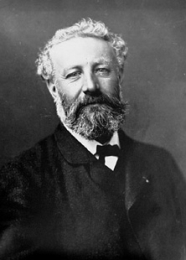The story starts with a comet called Gallia, that touches the Earth in its flight and collects a few small chunks of it. The disaster occurred on January 1 of the year 188x in the area around Gibraltar. On the territory that was carried away by the comet there remained a total of thirty-six people of French, eng, Spanish and Russian nationality. These people did not realize at first what had happened, and considered the collision an earthquake. They first noticed weight loss: the adjutant of Captain Servadac Ben Zoof to his amazement jumped twelve meters high. Zoof with Servadac also soon noticed that the alternation of day and night is shortened to six hours, that east and west changed sides, and that water begins to boil at 66 degrees Celsius, from which they rightly deduced that atmosphere became thinner and pressure dropped. At the beginning of their stay in Gallia they noticed the Earth with the Moon, but thought it was an unknown planet. Other important information was obtained through their research expedition with a ship, which the comet also took. During the voyage they discovered a mountain chain blocking the sea, which they initially considered to be the Mediterranean Sea and then they found the island of Formentera (before the catastrophe a part of the Balearic Islands). where they found a French astronomer Palmyrin Rosette, who helped them to solve all the mysterious phenomena. They were all on the comet which was discovered by Rosette a year ago and predicted a collision course with Earth, but no one believed the astronomer, because a layer of thick fog at the time prevented astronomical observations in other places... (Excerpt from Wikipedia)
Dieser Download kann aus rechtlichen Gründen nur mit Rechnungsadresse in A, B, BG, CY, CZ, D, DK, EW, E, FIN, F, GR, HR, H, IRL, I, LT, L, LR, M, NL, PL, P, R, S, SLO, SK ausgeliefert werden.










